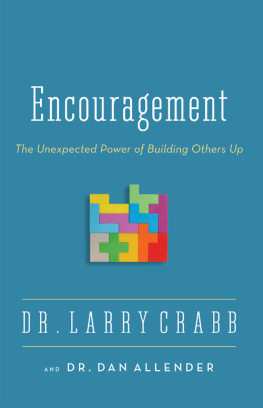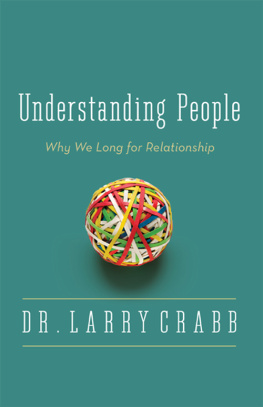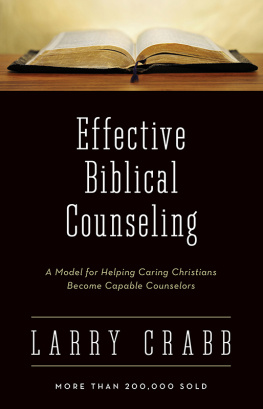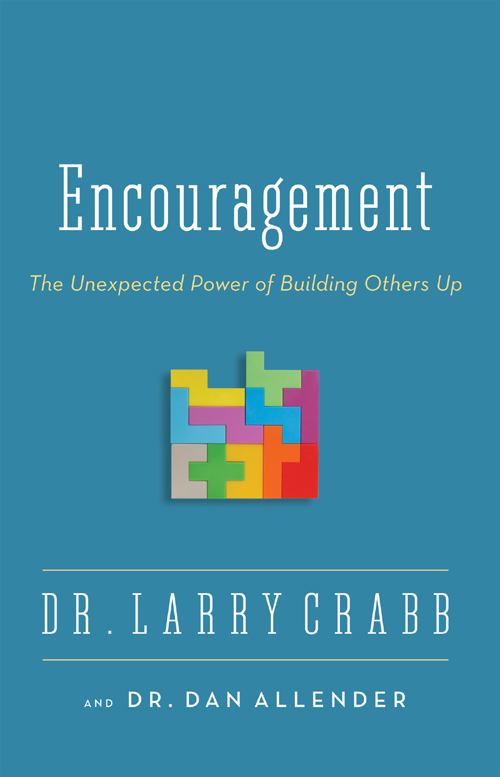DR. LARRY CRABB
AND DR. DAN ALLENDER
E ncouragement is important business. It merits our careful attention, not only because Scripture tells us directly to think about it, but also because it represents one unique value of Christian fellowship. Any group of compatible people can enjoy themselves, but Christians can enrich their social enjoyment with the knowledge that when they spend time together, they can have an eternally significant impact on one another.
The book of Hebrews tells us to encourage one another. After reviewing the unique privileges that belong to us because of Christs past work as sin-bearer and his present work as priest, the writer to the Hebrews (10:19 25) urges us to think about three things. First, we are to approach God with a conscious awareness of our absolute acceptance in Christ. Second, because God is faithful, we are to cling tenaciously to the prospect of our eternal acceptance in heaven. Third, we are to give serious thought to how we can encourage one another.
We are reminded in Hebrews 3:12 14 that difficulties along the path of obedience can weaken our determination to follow Christ and therefore we should encourage one another. The thought in both Scripture passages seems to be that we are to motivate each other to walk with the Lord more closely, encouraging one another to live out the truth of our position in Christ by loving others and doing good works.
This book is an effort to obey the invitation to consider how we may spur one another on toward love and good deeds, not giving up meeting together, but encouraging one another and all the more as you see the Day approaching (Hebrews 10:24 25).
In earlier books, I (Larry) have sought to show that the work of counseling belongs in the church. Local churches can and should assume responsibility for restoring troubled people to lives of effective worship and service. It is gratifying to see that more and more churches are recognizing this responsibility and are making efforts to include counseling among their ministries. In developing a counseling ministry, churches must give prime attention to helping their people become encouragers. The first step toward making counseling in the local church a reality is to train every committed church member in the skills of counseling by encouragement.
A simply worded definition of encouragement might be this: Encouragement is the kind of expression that helps someone want to be a better Christian, even when life is rough. By the grace of God, I can have that effect on your life and you can have it on mine. We must apply our mental energies to the job of understanding precisely how we can perform this important work for each other.
All chapters except 12 and 13 are written by Larry Crabb.
T he more I understand people and their needs, the more I am persuaded that God has uniquely designed the local church to respond to those needs. And as my conviction grows, so does my frustration.
The needs of people, to at least some degree, are obvious to all but the most insensitive and self-centered. Even a casual consideration of the healing potential of relationship with Christ makes it clear that the deep wounds of hurting people can be substantially healed. But still we attend to lesser matters and lose sight of what can be done. The church, where Christs holiness and love are to be evidenced the most, too often becomes an organization just seeking to perpetuate itself, while the reasons why it should continue and grow are obscured.
When the central dynamic of living in relationship with God and each other is made secondary to concern for better facilities, expanded programs, or more staff, then the quietly enriching and soul-stirring excitement of life in Christ is numbed. The Christian life is in danger of being reduced to (depending on the personality of the leadership) either a pep rally for Jesus or an irritating set of restrictions.
The muscles of relationship within the Christian body atrophy when we fail to exercise them, and the church becomes limp. Attendance falls off, volunteers are hard to come by, and a vague but strong mood of indifference spreads through the body. Rather than realizing that the life of the church lies in its worshipful relationship to God and its loving connections with one another, the leadership may diagnose the problems as weak commitment, boring services, or rebellious attitudes. These problems may indeed exist and require remedy, but they might not be the core issue.
The church often responds to such misdiagnoses by trying to create and maintain a soul-grabbing level of excitement and by legislating stronger commitment for members who fail to catch the disease of induced enthusiasm. Church services may begin reflecting a polished professionalism more appropriate to a black-tie-and-tails banquet than to a meeting of the family. Stragglers from the fold may be called back with noisy exhortations that give the impression that church life is one long boot camp directed by a tough drill sergeant. Through it all, the potential of the church for satisfying longings and for nourishing life diminishes. Worship becomes ritual, and teaching loses power.
How can we recapture our focus in the church? What can we do to shift our attention back to relating to God and to each other in loving fellowship and mutual ministry? The task is especially difficult because each of us tends to regard our focus as clear and the other persons as blurred. No pastor would say that his or her church does not revolve around loving God and loving others.
One pastor will argue I think correctly that expository preaching directs attention to Gods character and peoples problems by presenting biblical truth. Another will maintain that a church that focuses on building relationships within the church community is more on target. Still another will speak warmly of the possibility of reaching more people with Gods love through expanded facilities and will thus regard the churchs building program as consistent with its purpose for being.
Church life seems to pass through various stages. The era of tent revivals and sawdust-trail conversions has largely yielded to a more settled (and stifling?) approach to doing the work of the church. In some circles, the emotionalism of rededication invitations has been replaced with a more sober emphasis on meaty teaching. But for some, that kind of teaching seems to result in cold orthodoxy. So they strive to inject new life into the ecclesiastical corpses through support groups. These groups attempt to strip away masks of phony contentment and to uncover the gutsy problems raging inside people. The idea is to build relationships through self-disclosure followed by mutual affirmation.
Critical observers have noted, however, that a relational focus can shift the foundation of the church away from dry truth to vibrant experience. The Bible may then become less the authority for belief and behavior and more the stimulus for building caring relationships. Meetings for Bible study to which participants come armed with commentaries and concordances have sometimes given way to groups in which people bring their needs, experiences, and opinions and occasionally an unstudied Bible.




















